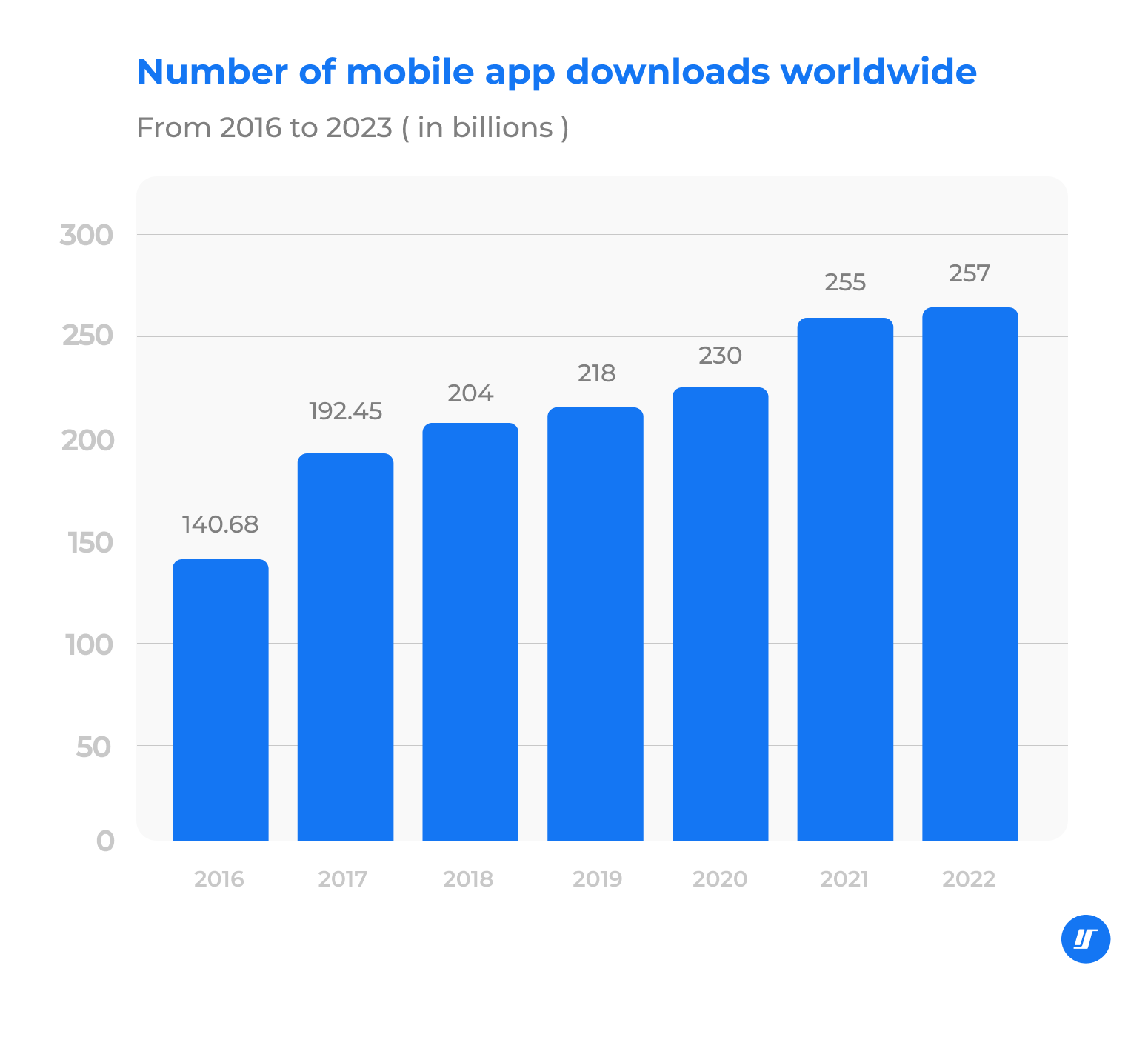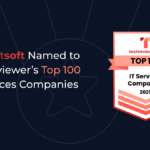Stepping into outsourcing isn’t just a trend but a strategic decision for business leaders, teams, and stakeholders alike.
Outsourcing app development has become a popular choice for businesses of all sizes, and there are many good reasons for this. By choosing to outsource, companies can save both time and money while still receiving high-quality mobile apps. This approach allows even small businesses to compete with larger companies, allowing them to access a highly skilled talent pool of specialized technical expertise and technologies, without heavy investment.
If you’re considering outsourcing your software development needs, keep reading! In this article, we explain the benefits and potential costs of outsourcing mobile app development and highlight how it can help your business grow faster. Let’s get started!
Here’s a brief overview of the mobile and web app development market in 2024:


Technology has come to be a synonym for progress. As a result, businesses are increasingly adopting mobile apps to remain modern and competitive.
With mobile apps accounting for 70% of all time spent on digital media, and global app downloads reaching 257 billion in 2023, app impact is undeniable. It goes without saying that apps drive substantial revenue – expected to reach $935 billion by 2024 – increasing competition in the market. About 90% of businesses see them as essential for market differentiation.
Beyond revenue, apps improve customer experiences, simplify workflows, and offer valuable data insights, making them crucial tools for business success in today’s digital landscape.
The promising yet challenging future of apps opens the door to a wealth of opportunities for various businesses. As companies integrate mobile apps into their strategic frameworks, a common question rears its head; “Should I outsource or hire in-house experts?”
We understand the challenges you may face in choosing the right path, and we’re here to guide those new to outsourcing.
Outsourcing vs. In-House: Choosing the Best Approach for Your Mobile App Development
Choosing between mobile application development outsourcing and in-house development is a tall order for many businesses. Outsourcing (if you decide to outsource iOS app development or outsource Android app development) offers access to a broader talent pool and often lower costs. On the other hand, some companies may prioritize having control and alignment with their company culture, which often leads them to prefer in-house development.
These aspects largely depend on your tech partner and the chosen model. At Intellectsoft, we adopt an agile development methodology that ensures our tech talents integrate seamlessly with your team, whether you’re outsourcing Android or iPhone app development.
Each approach has its unique benefits. The right choice depends on your company’s specific needs, budget, and long-term goals. By considering these factors, you can find the best fit for your mobile app development.
Pros of Mobile App Development Outsourcing
The decision to outsource mobile app development – be it for Android or iPhone – yields various benefits for a company’s operations. Why outsourcing may be the best idea?
We’ll dive into the details later in this article, but for now, it’s worth highlighting a few key points:
- It reduces project costs.
- No need to recruit new team members.
- It shortens timeframes for project completion and product launch.
- It enables you to meet market demands quickly.
- It provides access to a global pool of highly skilled app developers and technology.
- It allows for strategic resource allocation and delegation of development tasks.
- It offers scalability and flexibility.
What’s more, outsourcing lightens the load by taking on many additional responsibilities, freeing businesses to focus on their core tasks.
Cons of Mobile Outsourcing
Regardless of the benefits, outsourcing mobile application development may have some challenges. There may be miscommunications due to cultural differences, varying work ethics, and time zone shifts. The good news is that these issues are manageable. You can effectively address and overcome these setbacks by establishing clear communication channels and finding overlapping work hours.
Pros of In-House Mobile Application Development
Having a full-time, in-house team offers several advantages for some business leaders. This approach enables close management of team dynamics and direct, face-to-face communication.
Cons of In-house Mobile Application Development
In-house mobile application development comes with its own set of challenges. It takes a good bit of investment in hiring skilled developers and in software, hardware, and infrastructure. These all can be financially burdensome. Finding and retaining top talent can be difficult, and new hires often need training, which can extend development timelines and impact product quality.
Why Outsource App Development
Around 60% of companies find outsourcing more efficient than managing app development in-house. For many, outsourcing opens the door to a new level of productivity. It’s a smart, cost-effective choice that connects you with top-tier talent to develop high-quality apps.
Here’s why it’s beneficial to outsource app development:
Cost-Effective Solutions
Outsourcing slashes development costs. By partnering with a software development company, you save on salaries, benefits, and overhead while maintaining an in-house team. Accessing a broader talent pool in regions with lower labor costs makes high-quality development more affordable, freeing up resources for other critical areas.
Global Talent Access
Outsourcing provides access to a diverse talent pool with expertise across various seniority levels. At Intellectsoft, for example, we employ developers with over 17 years of experience, as well as creative middle developers bringing fresh perspectives. Collaborating with teams worldwide allows you to approach projects from different angles, building a thorough solution.
Scalable and Flexible Approach
Outsourcing offers exceptional scalability. Adjust your development team’s size based on project needs without the hassles of hiring or layoffs. This flexibility lets you respond swiftly to changing market demands, ramping up or scaling down as necessary.
Refined Focus on Core Activities
Outsourcing allows you to concentrate on what truly matters – your core business functions. By entrusting app development to experts, you can channel more resources into activities that drive success. This strategic focus often leads to increased efficiency and productivity.
Accelerated Time-to-Market
An experienced outsourced team can deliver projects quickly through established workflows and extensive experience. At Intellectsoft, our agile methodologies ensure that we adapt swiftly to project needs, keeping everything on track and on schedule.
Ongoing Support and Maintenance
Partnering with an outsourcing firm means ongoing support and maintenance. Your dedicated team will be ready to help with updates, feature additions, and any issues that arise, ensuring your software remains in top shape.
Proactive Risk Management
Established outsourcing firms have strong risk management processes in place, including quality assurance and project management, ensuring deadlines are met and quality standards are upheld.
Latest Technology Access
Outsourcing companies stay ahead of the curve with the latest technologies and trends, like AI and Cloud Computing. Our blend of seasoned professionals and innovative junior specialists ensures reliable applications with a forward-thinking approach.
Efficient Resource Management
Clearly, outsourcing simplifies resource management. You won’t have to worry about workspace, equipment, or technical infrastructure—your outsourcing partner handles it all.
Enhanced Security Measures
Outsourcing companies prioritize client protection with continuous monitoring, compliance with security standards, and well-defined incident response plans. Many also offer training programs to further reduce risks.
App Development Outsourcing Models
You might be wondering: How does app outsourcing actually work? Are there specific models that outsourcing partners offer? The answer is yes! There are three main engagement models: the dedicated team model, the team extension model, and the project-based model.
We recommend getting acquainted with each of them to find the perfect fit for your business needs. Let’s take a closer look:
Dedicated Team Model:
A dedicated team of developers works exclusively on your project, integrating seamlessly with your in-house team. This model offers greater control, flexibility, and a deep understanding of your project, perfect for long-term collaboration. Keep in mind, though, it requires more hands-on management and coordination from your side.
Project-Based Outsourcing:
In this setup, the outsourcing company takes care of the entire project from start to finish, following your specifications. It’s a great choice if you want a clear scope and budget with minimal management overhead. Like all models, project-based outsourcing benefits from detailed initial planning and clear requirements.
Extension Model:
This model lets you bring in additional developers or specialists to fill gaps in your in-house team, often temporarily. It’s a flexible way to scale your team up or down as needed, while still keeping control. Just be prepared – it takes management effort to integrate these new team members smoothly.
Choosing the right outsourcing model isn’t a one-size-fits-all decision. It depends on factors like your project’s scope, budget, timeline, and the level of control and flexibility you need. Each model has its own benefits and challenges, so choose the one that best aligns with your goals.
If you’re unsure which path to take, don’t hesitate to reach out to your outsourcing partner. They can help you explore all the options and provide expert advice to guide you to the right decision.
Steps to Successful App Development Outsourcing
1. Define project requirements:
Start by clearly outlining what your app needs. Detail the features, functionalities, and objectives to ensure everyone is on the same page. Clear project requirements will guide each step of the process and help transform your vision into a successful app.
- Budget: Decide on an initial budget for your app development project. A budget range will help set timeline expectations for your project.
- Timelines: Think about when you want the project completed, including key milestones and the final delivery date.
2. Choose an Outsourcing Types:
Select the outsourcing types that best fit your goals. If budget constraints and continuous development are top priorities, offshoring could be the ideal solution. For example, if you are based in the USA, outsourcing app development to India will be considered offshoring. This approach offers access to a diverse pool of global talent and notable cost savings.
On the other hand, if you value cultural alignment or need to work within similar time zones, onshoring or nearshoring might be better suited for your needs.
3. Identify the Right App Development Companies:
With your outsourcing model in mind, create a shortlist of potential partners. Evaluate companies based on their skills, expertise, pricing, and reputation. Review case studies, client testimonials, and independent reviews to ensure they have the credentials to meet your project’s needs.
4. Evaluate and select an outsourcing team:
Based on your research, choose the most suitable partner to outsource mobile app development. Decide on a payment model that fits your project. If flexibility is needed, consider a time-and-materials model, where you’re billed for actual hours worked.
While a fixed-price model offers cost certainty and well-defined deliverables, It may not provide the flexibility needed to meet unforeseen changes and challenges along the way.
5. Establish project management:
Once the contract is in place, outline how your collaboration with the outsourcing team will work. Define workflows, coordinate between your in-house and outsourced teams, and set up systems for tracking and reporting progress. A dedicated project manager can help keep everything aligned with your objectives and ensure smooth execution.
6. Ensure support and maintenance post-launch:
The launch is just the beginning. Set up support and maintenance services to ensure your app’s ongoing success. By having the same team handle post-launch support, you benefit from their deep understanding of the app to address issues quickly, implement updates, and improve the app based on user feedback.
Managing Risks in Outsourcing Mobile App Development
Opting to outsource mobile app development can offer numerous benefits, but it’s important to be aware of potential risks that can arise. Understanding these risks can help you prepare and manage them effectively, ensuring a smoother development process. Here are some common risks and what to watch out for:
- Communication: Keep communication clear and consistent to avoid any misunderstandings.
- Cultural Differences: Be aware of cultural differences that might impact collaboration and outcomes.
- Scope Creep: Clearly define the project scope to prevent unnecessary changes and stay on track.
- Security Policies: Ensure your outsourcing partner follows strong data protection standards to keep your information safe.
- Payment Models: Understand that fixed-price models can be less flexible if project requirements shift, so make sure your needs are well-defined from the start.
Staying ahead in the process and choosing the right partner can turn potential risks into a smooth and successful outsourcing experience.
How to Choose an App Development Outsourcing Provider
Choosing a reliable partner opens the door to a world of talented professionals with diverse skills and experience. Simply define your needs and requirements, and your outsourcing partner will manage the rest. This way, you’ll get scalable applications that can drive your business forward.
When selecting an app development company or agency, keep these key points in mind:
- Experience and Expertise: Find a company with a solid track record in mobile and web app development. Check out their portfolio and read client testimonials to see their proven success.
- Customization: Make sure they can develop tailored solutions to meet your needs.
- Technology Stack: Look for a company that uses the latest technologies and stays updated with current development trends.
- Communication: Ensure they have a clear and effective communication process in place.
- Research and Testing: Great companies thoroughly research and test to understand your needs and deliver the best possible solution.
Cost of Outsourcing App Development
One of the most common questions clients ask is, “What is the cost of mobile and web app development?” While it’s a valid question, there isn’t a one-size-fits-all answer. The cost can vary significantly depending on several factors.
The type of app you’re developing plays an important role in determining costs, with simple apps generally being less expensive than complex, feature-rich ones. The timeline also affects the cost; if you need to launch quickly, additional resources or expedited work may be required, which can drive up the price. Additionally, the size and expertise of the team required for your project can influence expenses – larger or more specialized teams typically come at a higher cost, and the level of expertise needed can further impact the overall price.
To help you better understand potential costs, here are some key questions to consider:
- What type of app are you developing? Define the core functionality and purpose of the application to assess complexity.
- How quickly do you need to launch? Determine your timeline to assess the speed and urgency required.
- What’s your budget? Based on your budget, your tech partner will select the best development approach for your project: native or cross-platform. Native development tends to be more costly.
- Do you need a team with specialized skills? Identify if your project requires specific technical expertise or niche skills. For high-performance iOS or Android apps, consider hiring experts who specialize in native app development. Alternatively, if you need to develop mobile apps quickly while maintaining efficiency, cross-platform development might be the right choice.
- How much support will you need? Consider the level of support you’ll require during and after the development phase.
- What level of UX or UI design is required? Evaluate the design needs to ensure a user-friendly and engaging experience.
- Where is your chosen development company based? Decide if geographical location impacts your decision based on time zones and communication preferences.
Answering these questions will help you better understand your project’s scope and cost.
For a tailored estimate, get in touch with us! Our consultants will provide you with a free, no-obligation quote.
At Intellectsoft, our team of experts is ready to bring your mobile app vision to life, whether it’s for Android, iOS, or both. We can build native apps or a cross-platform solution, depending on what you need. We’re here to guide you through your options and deliver a solution that meets your expectations.
FAQ
What should I look for when choosing to outsource app development?
When choosing an outsourcing partner, prioritize experience and a strong portfolio. Look for partners who have successfully managed projects similar to yours and possess expertise in the required technologies. Additionally, customer testimonials can offer valuable insights into their performance and reliability.
How can I ensure high quality when working with outsourced developers?
To maintain high quality, establish clear communication and request regular updates. Clearly define your project requirements, including features and deadlines, from the outset. Request prototypes and conduct regular testing throughout the process. Choosing a reputable tech partner with a proven track record is also key to ensuring quality.
What potential risks come with outsourcing app development, and how can I address them?
Outsourcing can come with challenges like time zone differences, cultural barriers, and varying quality. Having a detailed contract and regular check-ins will help keep everything on track and make it easy to tackle any issues that come up.
How does the location of an outsourced app development team impact the project?
Location can affect communication, especially with time zone differences. If this might be a challenge, consider nearshore or onshore outsourcing. Also, keep in mind any legal and regulatory differences that could come into play.
Subscribe to updates
Source link











